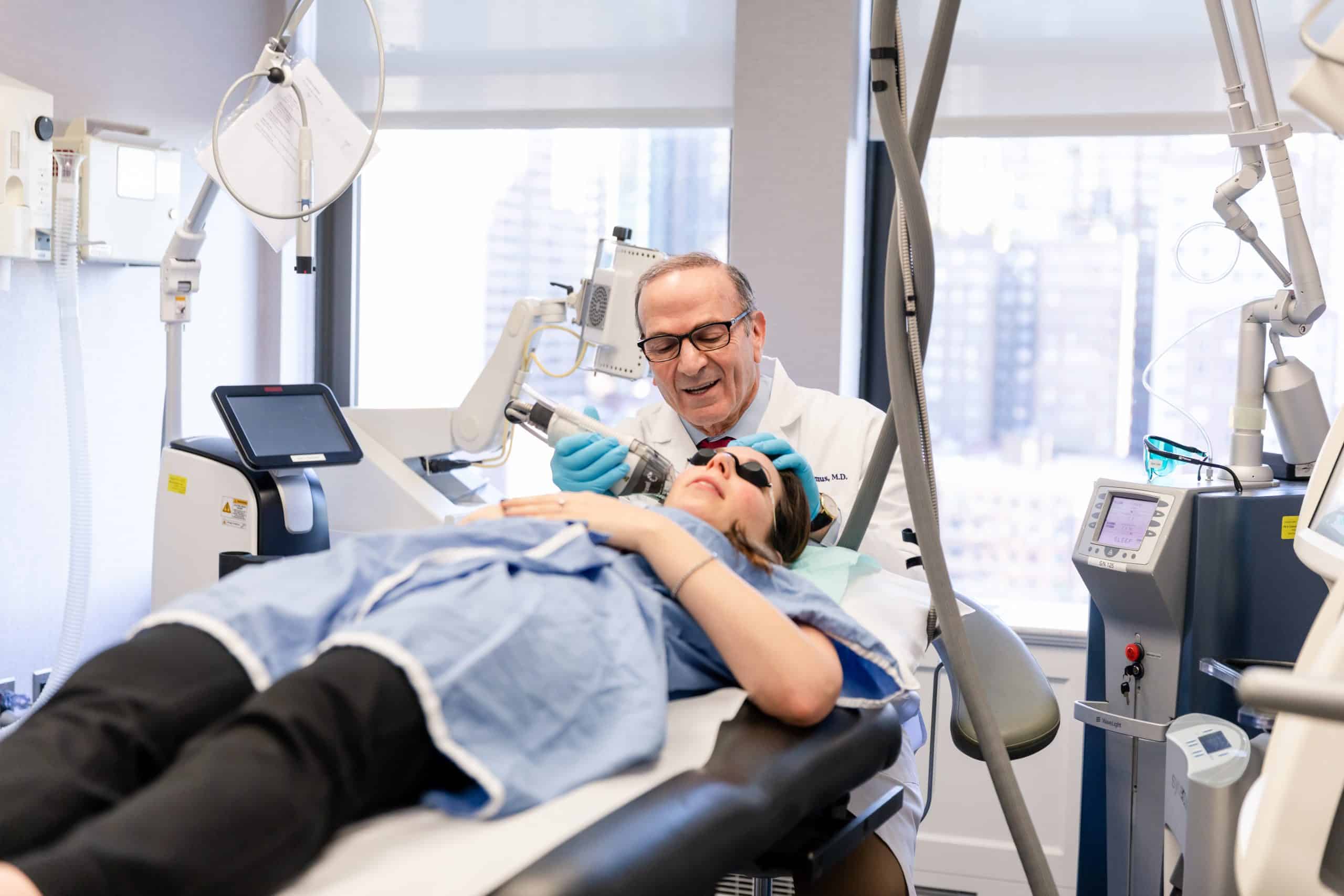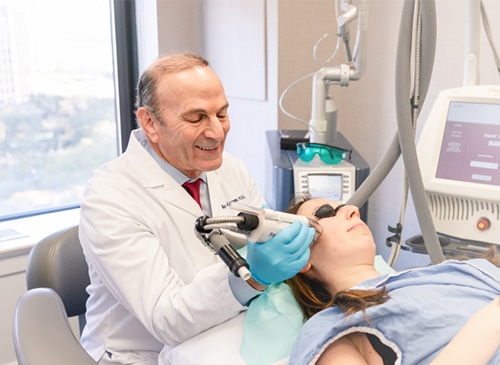Homepage // Conditions / Hemangiomas
hemangiomas
Hemangiomas are a collection of large blood vessels that typically begin growing shortly after birth.
hemangiomas
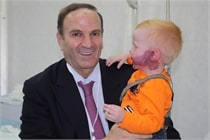
Hemangiomas grow rapidly during the first several weeks and months of life, then begin to disappear over several years. They are most commonly found in twins and premature babies. Mature hemangiomas that have not resolved spontaneously in older children, teenagers and adults are excellent candidates for laser treatment.
Our New York City physicians have over thirty year’s experience in the treatment of hemangiomas and related vascular birthmarks.
What experience do the doctors at Laser and skin surgery center of new york have?
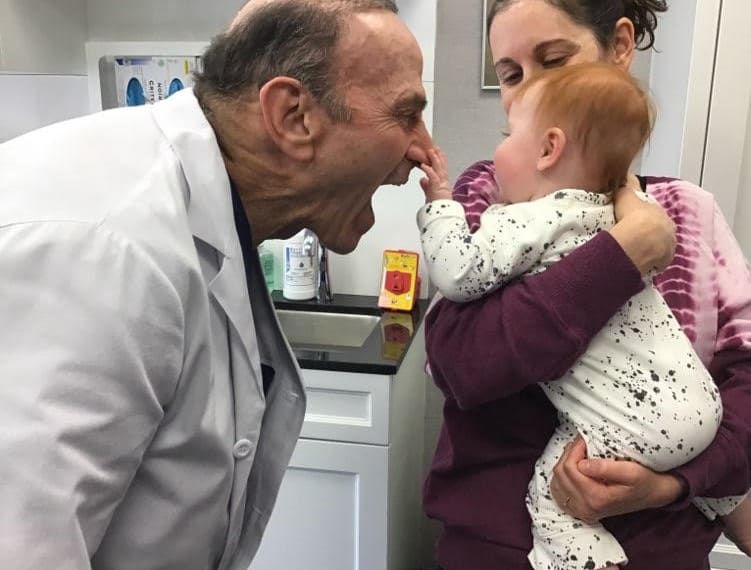
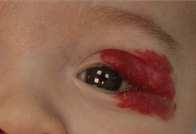
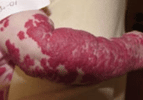
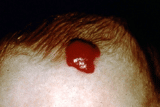
Treatment Options for Hemangiomas
Our publication of the combined use of propranolol and pulsed dye laser treatment together showed faster resolution of the hemangiomas with a shorter course of propranolol and less rebound growth after discontinuation of oral medicine. This combined approach has become our standard treatment for many of the hemangiomas that have a deeper or thicker component.
We most commonly treat superficial hemangiomas in infants, children and in those adults where the hemangiomas have not resolved spontaneously. Treatment at our New York medical centers often begins early in infancy and will require multiple treatments. Visit pubmed.gov to learn more about infant hemangiomas treatment.
what devices are used to treat hemangiomas?
Hemangiomas are frequently treated through pulsed dye and vascular lasers.
We use these devices:
- Excel V™ KTP
- nd:YAG
- Vbeam Perfecta™ Pulsed Dye Laser
- Vbeam Prima®
Publications
Effect of General Anesthesia on Neurodevelopmental Abnormalities in Children Undergoing Treatment of Vascular Anomalies With Laser Surgery: A Retrospective Review
Dermatol Surg. 2016 Dec 26. doi: 10.1097
Laser treatment in the management of infantile hemangiomas and capillary vascular malformations
Tech Vasc Interv Radiol. 2013 Mar: 16(1):51-4.
Retrospective study of the treatment of infantile hemangiomas using a combination of propranolol and pulsed dye laser
Dermatol Surg. 2013 Jun;39(6):923-33.
Commentary of “Beneficial effects of early pulsed dye laser therapy in patients with infantile hemangiomas”
Dermatol Surg. 2012 Oct; 38(10):1739-40.
Ablative Fractional Resurfacing for Involuted Hemangioma Residuum
Arch Dermatol. 2012 Nov; 148(11): 1294-8.
Infantile hemangiomas treated with a combination of propranolol and pulsed dye laser
Lasers Surg Med. 2012; 44(S24):3-4.
Glomuvenous Malformations (familial generalized multiple glomangiomas)
Dermatol Online J. 2011 Oct; 17(10):9. Review.
Letter regarding early laser treatment of periorbital infantile hemangiomas may work, but is it really the best treatment option?
Dermatol Surg. 2010; 36(9):1495-97.
Early laser treatment of periorbital infantile hemangiomas may work, but is it really the best treatment option?
Dermatol Surg. 2010 Sep; 36(9):1495-7.
Treatment of Superficial Infantile Hemangiomas of the Eyelid USing the 595-nm Pulsed Dye Laser
Dermatol Surg. 2010 May; 36(5):590-597.
Outcomes of Childhood Hemangiomas Treated with the Pulsed-Dye Laser with Dynamic Cooling: A Retrospective Chart Analysis
Dermatol Surg. 2009 Dec; 35(12):1947-54.
Our approach to pediatric dermatologic laser surgery
Lasers Surg Med. 2005 Oct; 37(4):255-63.
Hemangiomas: evaluation and treatment
Dermatol Surg. 2001 May; 27(5):475-85.
Multimodal management of diffuse neonatal hemangiomatosis
J Am Acad Dermatol. 1997 Dec; 37(6):1019-21.
Guidelines of care for hemangiomas of infancy
J Am Acad Dermatol. 1997 Oct; 37(4):631-7.
The pulsed-dye laser for infantile hemangiomas
Plast Reconstr Surg. 1996 May; 97(6):1302-3.
Adverse effects associated with the 577 – and 585 – nanometer pulsed dye laser in the treatment of cutaneous vascular lesions: a study of 500 patients
J Am Acad Dermatol. 1995 Apr; 32(4):613-7.
Interferon alfa-2a therapy for extensive perianal and lower extremity hemangioma
J Am Acad Dermatol. 1993 Jul; 29(1):98-9.
Pulsed dye laser treatment of vascular lesions in children
J Dermatol Surg Oncol. 1993 Apr; 19(4):303-10.
Supraumbilical midabdominal raphe, sternal atresia, and hemangioma in an infant: response of hemangioma to laser and interferon alfa-2a
Pediatr Dermatol. 1993 Mar; 10(1):71-6.
Failure of the flashlamp-pumped pulsed dye laser to prevent progression to deep hemangioma
Pediatr Dermatol. 1993 Mar; 10(1):77-80.
Capillary hemangiomas and treatment with the flashlamp-pumped pulsed dye laser
Arch Dermatol. 1991 Feb; 127(2):202-5.
Porokeratosis of Mibelli with underlying hemangioma treated by the flashlamp-pumped pulsed dye laser
Cutis. 1990 Nov; 46(5):410-2.
Real Patients Before and After photos
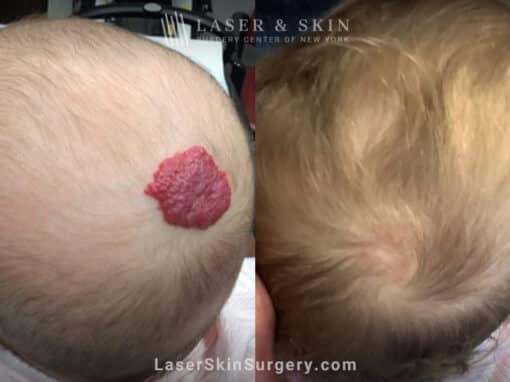
Pulsed dye laser treatments to minimize hemangioma on infant’s scalp
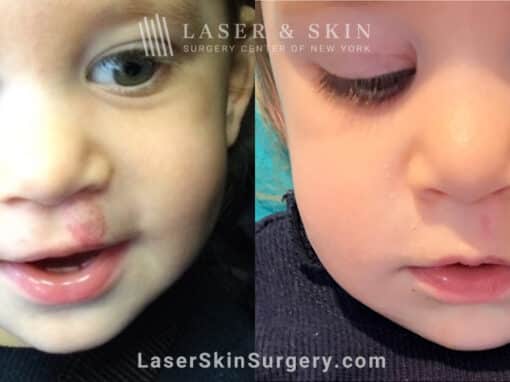
Laser treatment for hemangioma above lip
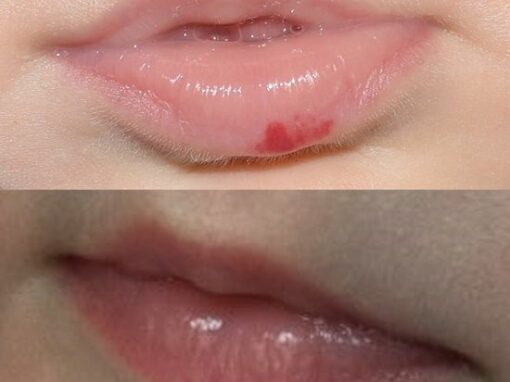
Laser Treatment for Hemangioma
Hemangioma Treatment In The News
hemangiomas
Questions and Answers
Q: What are Hemangiomas?
A: Hemangiomas are a collection of large blood vessels that typically begin shortly after birth. These birthmarks grow rapidly during the first several weeks and months of life, then begin to disappear over several years. Hemangiomas are most commonly found in twins and premature babies.
Q: Should Hemangiomas Be Treated?
A: Hemangiomas can be treated to minimize the extent of their growth and to hasten the process of disappearance. Some hemangiomas can be problematic in the sense that they may be interfering with normal function or may have the potential to bleed. In many cases, it is advised to have hemangiomas undergo treatment to prevent short term and long term complications.
Q: What Are The Treatment Options?
A: Options for the treatment of hemangiomas include laser therapy, steroid therapy, surgical excision, and of course, watchful waiting.
Q: What Does A Typical Treatment Plan Look Like?
A: Treatments in the office are performed with either topical anesthesia (EMLA or LMX), local anesthesia or none. We begin treatment in early infancy to facilitate the optimum response and outcome. Typically, multiple treatments are required and a complete cure is not always possible. Treatment intervals are usually at two-week intervals for infants but may vary based upon the variety of factors, including the location of the hemangioma and the age of the patient.
Q: When Is Laser Treatment Performed?
A: Laser treatments are generally performed during early infancy to prevent further growth. They can also be performed in later years to facilitate the disappearance of any hemangioma that has not resolved spontaneously.
Q: Which Lasers are Used for this Purpose?
A: We generally prefer to use the V-Beam Perfecta or the V-Star laser in the treatment of hemangiomas. Occasionally, we also use the Neodymium:YAG laser as well.
Q: How Often Are Laser Treatment Performed?
A: During early infancy when hemangiomas are still growing, we prefer to perform treatments at two to three-week intervals to avoid re-growth between treatment sessions. During later years when the hemangioma has stopped growing, treatments can be performed at one month or later intervals.
Q: Is Anesthesia Required?
A: In most cases anesthesia is not required because of the small size of the hemangioma and the cooling devices utilized by the lasers to minimize discomfort. On some occasions we will use topical anesthesia.
Q: Is The Procedure Painful?
A: Generally the treatment sessions are very short and quick and the degree of discomfort is minimal.
Q: Do You Accept Insurance For This Procedure?
A: Our highly experienced and dedicated team of physicians and nurses cater to the needs of hemangioma patients. Most insurance plans are accepted for treatment and our insurance staff works diligently to help our patients receive insurance coverage.
Q: What Does The Skin Look Like After Each Treatment?
A: Generally, there is bruising of the hemangioma that can last for seven to ten days. On occasion, there can be some minor crusting which heals relatively quickly.
Q: Who should Perform Laser Treatment of Hemangiomas?
Next, read about…
Sagging Skin
The skin’s underlying structure degrades over time, leading to skin laxity and sagging skin. Collagen, the essential protein in our skin, begins to decline as early as our 20s, leaving skin without support from within. Restoring collagen helps to restore the skin’s youthful vitality.
Wrinkles
Wrinkles are a common and unwanted sign of aging. As you age, your body produces less collagen, creating saggy and wrinkly looking skin. Our customized strategies to combat wrinkles include laser resurfacing, dermal fillers, and wrinkle relaxers.
Brown age spots
Age spots and brown spots (also known as sunspots, liver spots, and lentigines) are a consequence of aging and sun exposure. The most effective treatment for eliminating these spots and other skin pigmentation is laser therapy, which usually includes little to no downtime after treatment.
Haven't found
WHAT you are looking for?
patient approved
Trusted Worldwide
patient approved
Trusted Worldwide
laser & skin surgery
center of new york
Contact us
Manhattan:
317 East 34th Street New York, NY 10016
Monday – Friday: 8:00am – 5:00pm
Saturday & Sunday: September through June by appointment only
Same-Day Appointments Now Available
Southampton:
325 Meeting House Lane, Bldg. 1, Ste. C Southampton, NY 11968
Monday - Wednesday, Friday: 9am - 4:30pm
Thursday: 9am - 5pm
Saturday October 1, 2022: By Appointment Only
Same-Day Appointments Now Available
Pay Online for Patients of Drs. Geronemus, Anolik, Bae & Seidenberg
Pay Online for Patients of Drs. Abraham, Bernstein, Krant, Shelton, Stern, Weiss, Hoffman, Shim, Murphy-Rose, Wilson, and Petratos
By LASER & SKIN SURGERY CENTER OF NEW YORK® | © 2024 All Rights Reserved. Design & Development by Goldman Marketing Group | Sitemap | Privacy Policy | The information available on this web site is provided for informational purposes only. This information is not intended to replace a medical consultation where a physician's judgment may advise you about specific disorders, conditions and or treatment options. We hope the information will be useful for you to become more educated about your health care decisions. If you are vision-impaired or have some other impairment covered by the Americans with Disabilities Act or a similar law, and you wish to discuss potential accommodations related to using this website, please contact us at (212) 941-5055.
*MDs perform 100% of all medical and cosmetic treatments.

